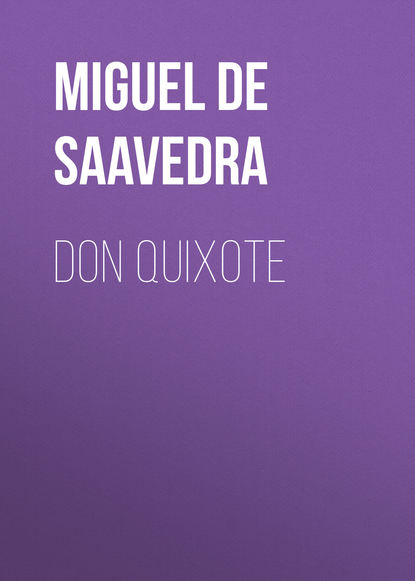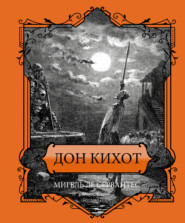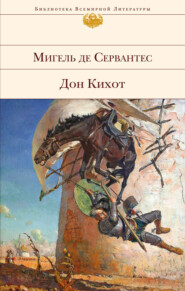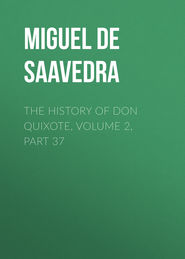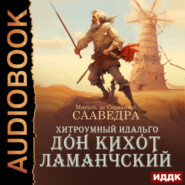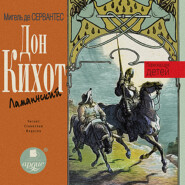По всем вопросам обращайтесь на: info@litportal.ru
(©) 2003-2025.
✖
Don Quixote
Настройки чтения
Размер шрифта
Высота строк
Поля
"Senor, I have no more to tell you than that from the moment when, through heaven's will and our being near neighbours, I first saw Dona Clara, your daughter and my lady, from that instant I made her the mistress of my will, and if yours, my true lord and father, offers no impediment, this very day she shall become my wife. For her I left my father's house, and for her I assumed this disguise, to follow her whithersoever she may go, as the arrow seeks its mark or the sailor the pole-star. She knows nothing more of my passion than what she may have learned from having sometimes seen from a distance that my eyes were filled with tears. You know already, senor, the wealth and noble birth of my parents, and that I am their sole heir; if this be a sufficient inducement for you to venture to make me completely happy, accept me at once as your son; for if my father, influenced by other objects of his own, should disapprove of this happiness I have sought for myself, time has more power to alter and change things, than human will."
With this the love-smitten youth was silent, while the Judge, after hearing him, was astonished, perplexed, and surprised, as well at the manner and intelligence with which Don Luis had confessed the secret of his heart, as at the position in which he found himself, not knowing what course to take in a matter so sudden and unexpected. All the answer, therefore, he gave him was to bid him to make his mind easy for the present, and arrange with his servants not to take him back that day, so that there might be time to consider what was best for all parties. Don Luis kissed his hands by force, nay, bathed them with his tears, in a way that would have touched a heart of marble, not to say that of the Judge, who, as a shrewd man, had already perceived how advantageous the marriage would be to his daughter; though, were it possible, he would have preferred that it should be brought about with the consent of the father of Don Luis, who he knew looked for a title for his son.
The guests had by this time made peace with the landlord, for, by persuasion and Don Quixote's fair words more than by threats, they had paid him what he demanded, and the servants of Don Luis were waiting for the end of the conversation with the Judge and their master's decision, when the devil, who never sleeps, contrived that the barber, from whom Don Quixote had taken Mambrino's helmet, and Sancho Panza the trappings of his ass in exchange for those of his own, should at this instant enter the inn; which said barber, as he led his ass to the stable, observed Sancho Panza engaged in repairing something or other belonging to the pack-saddle; and the moment he saw it he knew it, and made bold to attack Sancho, exclaiming, "Ho, sir thief, I have caught you! hand over my basin and my pack-saddle, and all my trappings that you robbed me of."
Sancho, finding himself so unexpectedly assailed, and hearing the abuse poured upon him, seized the pack-saddle with one hand, and with the other gave the barber a cuff that bathed his teeth in blood. The barber, however, was not so ready to relinquish the prize he had made in the pack-saddle; on the contrary, he raised such an outcry that everyone in the inn came running to know what the noise and quarrel meant. "Here, in the name of the king and justice!" he cried, "this thief and highwayman wants to kill me for trying to recover my property."
"You lie," said Sancho, "I am no highwayman; it was in fair war my master Don Quixote won these spoils."
Don Quixote was standing by at the time, highly pleased to see his squire's stoutness, both offensive and defensive, and from that time forth he reckoned him a man of mettle, and in his heart resolved to dub him a knight on the first opportunity that presented itself, feeling sure that the order of chivalry would be fittingly bestowed upon him.
In the course of the altercation, among other things the barber said, "Gentlemen, this pack-saddle is mine as surely as I owe God a death, and I know it as well as if I had given birth to it, and here is my ass in the stable who will not let me lie; only try it, and if it does not fit him like a glove, call me a rascal; and what is more, the same day I was robbed of this, they robbed me likewise of a new brass basin, never yet handselled, that would fetch a crown any day."
At this Don Quixote could not keep himself from answering; and interposing between the two, and separating them, he placed the pack-saddle on the ground, to lie there in sight until the truth was established, and said, "Your worships may perceive clearly and plainly the error under which this worthy squire lies when he calls a basin which was, is, and shall be the helmet of Mambrino which I won from him in fair war, and made myself master of by legitimate and lawful possession. With the pack-saddle I do not concern myself; but I may tell you on that head that my squire Sancho asked my permission to strip off the caparison of this vanquished poltroon's steed, and with it adorn his own; I allowed him, and he took it; and as to its having been changed from a caparison into a pack-saddle, I can give no explanation except the usual one, that such transformations will take place in adventures of chivalry. To confirm all which, run, Sancho my son, and fetch hither the helmet which this good fellow calls a basin."
"Egad, master," said Sancho, "if we have no other proof of our case than what your worship puts forward, Mambrino's helmet is just as much a basin as this good fellow's caparison is a pack-saddle."
"Do as I bid thee," said Don Quixote; "it cannot be that everything in this castle goes by enchantment."
Sancho hastened to where the basin was, and brought it back with him, and when Don Quixote saw it, he took hold of it and said:
"Your worships may see with what a face this squire can assert that this is a basin and not the helmet I told you of; and I swear by the order of chivalry I profess, that this helmet is the identical one I took from him, without anything added to or taken from it."
"There is no doubt of that," said Sancho, "for from the time my master won it until now he has only fought one battle in it, when he let loose those unlucky men in chains; and if had not been for this basin-helmet he would not have come off over well that time, for there was plenty of stone-throwing in that affair."
CHAPTER XLV.
IN WHICH THE DOUBTFUL QUESTION OF MAMBRINO'S HELMET AND THE PACK-SADDLE IS FINALLY SETTLED, WITH OTHER ADVENTURES THAT OCCURRED IN TRUTH AND EARNEST
"What do you think now, gentlemen," said the barber, "of what these gentles say, when they want to make out that this is a helmet?"
"And whoever says the contrary," said Don Quixote, "I will let him know he lies if he is a knight, and if he is a squire that he lies again a thousand times."
Our own barber, who was present at all this, and understood Don Quixote's humour so thoroughly, took it into his head to back up his delusion and carry on the joke for the general amusement; so addressing the other barber he said:
"Senor barber, or whatever you are, you must know that I belong to your profession too, and have had a licence to practise for more than twenty years, and I know the implements of the barber craft, every one of them, perfectly well; and I was likewise a soldier for some time in the days of my youth, and I know also what a helmet is, and a morion, and a headpiece with a visor, and other things pertaining to soldiering, I meant to say to soldiers' arms; and I say-saving better opinions and always with submission to sounder judgments – that this piece we have now before us, which this worthy gentleman has in his hands, not only is no barber's basin, but is as far from being one as white is from black, and truth from falsehood; I say, moreover, that this, although it is a helmet, is not a complete helmet."
"Certainly not," said Don Quixote, "for half of it is wanting, that is to say the beaver."
"It is quite true," said the curate, who saw the object of his friend the barber; and Cardenio, Don Fernando and his companions agreed with him, and even the Judge, if his thoughts had not been so full of Don Luis's affair, would have helped to carry on the joke; but he was so taken up with the serious matters he had on his mind that he paid little or no attention to these facetious proceedings.
"God bless me!" exclaimed their butt the barber at this; "is it possible that such an honourable company can say that this is not a basin but a helmet? Why, this is a thing that would astonish a whole university, however wise it might be! That will do; if this basin is a helmet, why, then the pack-saddle must be a horse's caparison, as this gentleman has said."
"To me it looks like a pack-saddle," said Don Quixote; "but I have already said that with that question I do not concern myself."
"As to whether it be pack-saddle or caparison," said the curate, "it is only for Senor Don Quixote to say; for in these matters of chivalry all these gentlemen and I bow to his authority."
"By God, gentlemen," said Don Quixote, "so many strange things have happened to me in this castle on the two occasions on which I have sojourned in it, that I will not venture to assert anything positively in reply to any question touching anything it contains; for it is my belief that everything that goes on within it goes by enchantment. The first time, an enchanted Moor that there is in it gave me sore trouble, nor did Sancho fare well among certain followers of his; and last night I was kept hanging by this arm for nearly two hours, without knowing how or why I came by such a mishap. So that now, for me to come forward to give an opinion in such a puzzling matter, would be to risk a rash decision. As regards the assertion that this is a basin and not a helmet I have already given an answer; but as to the question whether this is a pack-saddle or a caparison I will not venture to give a positive opinion, but will leave it to your worships' better judgment. Perhaps as you are not dubbed knights like myself, the enchantments of this place have nothing to do with you, and your faculties are unfettered, and you can see things in this castle as they really and truly are, and not as they appear to me."
"There can be no question," said Don Fernando on this, "but that Senor Don Quixote has spoken very wisely, and that with us rests the decision of this matter; and that we may have surer ground to go on, I will take the votes of the gentlemen in secret, and declare the result clearly and fully."
To those who were in the secret of Don Quixote's humour all this afforded great amusement; but to those who knew nothing about it, it seemed the greatest nonsense in the world, in particular to the four servants of Don Luis, as well as to Don Luis himself, and to three other travellers who had by chance come to the inn, and had the appearance of officers of the Holy Brotherhood, as indeed they were; but the one who above all was at his wits' end, was the barber whose basin, there before his very eyes, had been turned into Mambrino's helmet, and whose pack-saddle he had no doubt whatever was about to become a rich caparison for a horse. All laughed to see Don Fernando going from one to another collecting the votes, and whispering to them to give him their private opinion whether the treasure over which there had been so much fighting was a pack-saddle or a caparison; but after he had taken the votes of those who knew Don Quixote, he said aloud, "The fact is, my good fellow, that I am tired collecting such a number of opinions, for I find that there is not one of whom I ask what I desire to know, who does not tell me that it is absurd to say that this is the pack-saddle of an ass, and not the caparison of a horse, nay, of a thoroughbred horse; so you must submit, for, in spite of you and your ass, this is a caparison and no pack-saddle, and you have stated and proved your case very badly."
"May I never share heaven," said the poor barber, "if your worships are not all mistaken; and may my soul appear before God as that appears to me a pack-saddle and not a caparison; but, 'laws go,'-I say no more; and indeed I am not drunk, for I am fasting, except it be from sin."
The simple talk of the barber did not afford less amusement than the absurdities of Don Quixote, who now observed:
"There is no more to be done now than for each to take what belongs to him, and to whom God has given it, may St. Peter add his blessing."
But said one of the four servants, "Unless, indeed, this is a deliberate joke, I cannot bring myself to believe that men so intelligent as those present are, or seem to be, can venture to declare and assert that this is not a basin, and that not a pack-saddle; but as I perceive that they do assert and declare it, I can only come to the conclusion that there is some mystery in this persistence in what is so opposed to the evidence of experience and truth itself; for I swear by" – and here he rapped out a round oath-"all the people in the world will not make me believe that this is not a barber's basin and that a jackass's pack-saddle."
"It might easily be a she-ass's," observed the curate.
"It is all the same," said the servant; "that is not the point; but whether it is or is not a pack-saddle, as your worships say."
On hearing this one of the newly arrived officers of the Brotherhood, who had been listening to the dispute and controversy, unable to restrain his anger and impatience, exclaimed, "It is a pack-saddle as sure as my father is my father, and whoever has said or will say anything else must be drunk."
"You lie like a rascally clown," returned Don Quixote; and lifting his pike, which he had never let out of his hand, he delivered such a blow at his head that, had not the officer dodged it, it would have stretched him at full length. The pike was shivered in pieces against the ground, and the rest of the officers, seeing their comrade assaulted, raised a shout, calling for help for the Holy Brotherhood. The landlord, who was of the fraternity, ran at once to fetch his staff of office and his sword, and ranged himself on the side of his comrades; the servants of Don Luis clustered round him, lest he should escape from them in the confusion; the barber, seeing the house turned upside down, once more laid hold of his pack-saddle and Sancho did the same; Don Quixote drew his sword and charged the officers; Don Luis cried out to his servants to leave him alone and go and help Don Quixote, and Cardenio and Don Fernando, who were supporting him; the curate was shouting at the top of his voice, the landlady was screaming, her daughter was wailing, Maritornes was weeping, Dorothea was aghast, Luscinda terror-stricken, and Dona Clara in a faint. The barber cudgelled Sancho, and Sancho pommelled the barber; Don Luis gave one of his servants, who ventured to catch him by the arm to keep him from escaping, a cuff that bathed his teeth in blood; the Judge took his part; Don Fernando had got one of the officers down and was belabouring him heartily; the landlord raised his voice again calling for help for the Holy Brotherhood; so that the whole inn was nothing but cries, shouts, shrieks, confusion, terror, dismay, mishaps, sword-cuts, fisticuffs, cudgellings, kicks, and bloodshed; and in the midst of all this chaos, complication, and general entanglement, Don Quixote took it into his head that he had been plunged into the thick of the discord of Agramante's camp; and, in a voice that shook the inn like thunder, he cried out:
"Hold all, let all sheathe their swords, let all be calm and attend to me as they value their lives!"
All paused at his mighty voice, and he went on to say, "Did I not tell you, sirs, that this castle was enchanted, and that a legion or so of devils dwelt in it? In proof whereof I call upon you to behold with your own eyes how the discord of Agramante's camp has come hither, and been transferred into the midst of us. See how they fight, there for the sword, here for the horse, on that side for the eagle, on this for the helmet; we are all fighting, and all at cross purposes. Come then, you, Senor Judge, and you, senor curate; let the one represent King Agramante and the other King Sobrino, and make peace among us; for by God Almighty it is a sorry business that so many persons of quality as we are should slay one another for such trifling cause." The officers, who did not understand Don Quixote's mode of speaking, and found themselves roughly handled by Don Fernando, Cardenio, and their companions, were not to be appeased; the barber was, however, for both his beard and his pack-saddle were the worse for the struggle; Sancho like a good servant obeyed the slightest word of his master; while the four servants of Don Luis kept quiet when they saw how little they gained by not being so. The landlord alone insisted upon it that they must punish the insolence of this madman, who at every turn raised a disturbance in the inn; but at length the uproar was stilled for the present; the pack-saddle remained a caparison till the day of judgment, and the basin a helmet and the inn a castle in Don Quixote's imagination.
All having been now pacified and made friends by the persuasion of the Judge and the curate, the servants of Don Luis began again to urge him to return with them at once; and while he was discussing the matter with them, the Judge took counsel with Don Fernando, Cardenio, and the curate as to what he ought to do in the case, telling them how it stood, and what Don Luis had said to him. It was agreed at length that Don Fernando should tell the servants of Don Luis who he was, and that it was his desire that Don Luis should accompany him to Andalusia, where he would receive from the marquis his brother the welcome his quality entitled him to; for, otherwise, it was easy to see from the determination of Don Luis that he would not return to his father at present, though they tore him to pieces. On learning the rank of Don Fernando and the resolution of Don Luis the four then settled it between themselves that three of them should return to tell his father how matters stood, and that the other should remain to wait upon Don Luis, and not leave him until they came back for him, or his father's orders were known. Thus by the authority of Agramante and the wisdom of King Sobrino all this complication of disputes was arranged; but the enemy of concord and hater of peace, feeling himself slighted and made a fool of, and seeing how little he had gained after having involved them all in such an elaborate entanglement, resolved to try his hand once more by stirring up fresh quarrels and disturbances.
It came about in this wise: the officers were pacified on learning the rank of those with whom they had been engaged, and withdrew from the contest, considering that whatever the result might be they were likely to get the worst of the battle; but one of them, the one who had been thrashed and kicked by Don Fernando, recollected that among some warrants he carried for the arrest of certain delinquents, he had one against Don Quixote, whom the Holy Brotherhood had ordered to be arrested for setting the galley slaves free, as Sancho had, with very good reason, apprehended. Suspecting how it was, then, he wished to satisfy himself as to whether Don Quixote's features corresponded; and taking a parchment out of his bosom he lit upon what he was in search of, and setting himself to read it deliberately, for he was not a quick reader, as he made out each word he fixed his eyes on Don Quixote, and went on comparing the description in the warrant with his face, and discovered that beyond all doubt he was the person described in it. As soon as he had satisfied himself, folding up the parchment, he took the warrant in his left hand and with his right seized Don Quixote by the collar so tightly that he did not allow him to breathe, and shouted aloud, "Help for the Holy Brotherhood! and that you may see I demand it in earnest, read this warrant which says this highwayman is to be arrested."
The curate took the warrant and saw that what the officer said was true, and that it agreed with Don Quixote's appearance, who, on his part, when he found himself roughly handled by this rascally clown, worked up to the highest pitch of wrath, and all his joints cracking with rage, with both hands seized the officer by the throat with all his might, so that had he not been helped by his comrades he would have yielded up his life ere Don Quixote released his hold. The landlord, who had perforce to support his brother officers, ran at once to aid them. The landlady, when she saw her husband engaged in a fresh quarrel, lifted up her voice afresh, and its note was immediately caught up by Maritornes and her daughter, calling upon heaven and all present for help; and Sancho, seeing what was going on, exclaimed, "By the Lord, it is quite true what my master says about the enchantments of this castle, for it is impossible to live an hour in peace in it!"
Don Fernando parted the officer and Don Quixote, and to their mutual contentment made them relax the grip by which they held, the one the coat collar, the other the throat of his adversary; for all this, however, the officers did not cease to demand their prisoner and call on them to help, and deliver him over bound into their power, as was required for the service of the King and of the Holy Brotherhood, on whose behalf they again demanded aid and assistance to effect the capture of this robber and footpad of the highways.
Don Quixote smiled when he heard these words, and said very calmly, "Come now, base, ill-born brood; call ye it highway robbery to give freedom to those in bondage, to release the captives, to succour the miserable, to raise up the fallen, to relieve the needy? Infamous beings, who by your vile grovelling intellects deserve that heaven should not make known to you the virtue that lies in knight-errantry, or show you the sin and ignorance in which ye lie when ye refuse to respect the shadow, not to say the presence, of any knight-errant! Come now; band, not of officers, but of thieves; footpads with the licence of the Holy Brotherhood; tell me who was the ignoramus who signed a warrant of arrest against such a knight as I am? Who was he that did not know that knights-errant are independent of all jurisdictions, that their law is their sword, their charter their prowess, and their edicts their will? Who, I say again, was the fool that knows not that there are no letters patent of nobility that confer such privileges or exemptions as a knight-errant acquires the day he is dubbed a knight, and devotes himself to the arduous calling of chivalry? What knight-errant ever paid poll-tax, duty, queen's pin-money, king's dues, toll or ferry? What tailor ever took payment of him for making his clothes? What castellan that received him in his castle ever made him pay his shot? What king did not seat him at his table? What damsel was not enamoured of him and did not yield herself up wholly to his will and pleasure? And, lastly, what knight-errant has there been, is there, or will there ever be in the world, not bold enough to give, single-handed, four hundred cudgellings to four hundred officers of the Holy Brotherhood if they come in his way?"
CHAPTER XLVI.
OF THE END OF THE NOTABLE ADVENTURE OF THE OFFICERS OF THE HOLY BROTHERHOOD; AND OF THE GREAT FEROCITY OF OUR WORTHY KNIGHT, DON QUIXOTE
While Don Quixote was talking in this strain, the curate was endeavouring to persuade the officers that he was out of his senses, as they might perceive by his deeds and his words, and that they need not press the matter any further, for even if they arrested him and carried him off, they would have to release him by-and-by as a madman; to which the holder of the warrant replied that he had nothing to do with inquiring into Don Quixote's madness, but only to execute his superior's orders, and that once taken they might let him go three hundred times if they liked.
"For all that," said the curate, "you must not take him away this time, nor will he, it is my opinion, let himself be taken away."
In short, the curate used such arguments, and Don Quixote did such mad things, that the officers would have been more mad than he was if they had not perceived his want of wits, and so they thought it best to allow themselves to be pacified, and even to act as peacemakers between the barber and Sancho Panza, who still continued their altercation with much bitterness. In the end they, as officers of justice, settled the question by arbitration in such a manner that both sides were, if not perfectly contented, at least to some extent satisfied; for they changed the pack-saddles, but not the girths or head-stalls; and as to Mambrino's helmet, the curate, under the rose and without Don Quixote's knowing it, paid eight reals for the basin, and the barber executed a full receipt and engagement to make no further demand then or thenceforth for evermore, amen. These two disputes, which were the most important and gravest, being settled, it only remained for the servants of Don Luis to consent that three of them should return while one was left to accompany him whither Don Fernando desired to take him; and good luck and better fortune, having already begun to solve difficulties and remove obstructions in favour of the lovers and warriors of the inn, were pleased to persevere and bring everything to a happy issue; for the servants agreed to do as Don Luis wished; which gave Dona Clara such happiness that no one could have looked into her face just then without seeing the joy of her heart. Zoraida, though she did not fully comprehend all she saw, was grave or gay without knowing why, as she watched and studied the various countenances, but particularly her Spaniard's, whom she followed with her eyes and clung to with her soul. The gift and compensation which the curate gave the barber had not escaped the landlord's notice, and he demanded Don Quixote's reckoning, together with the amount of the damage to his wine-skins, and the loss of his wine, swearing that neither Rocinante nor Sancho's ass should leave the inn until he had been paid to the very last farthing. The curate settled all amicably, and Don Fernando paid; though the Judge had also very readily offered to pay the score; and all became so peaceful and quiet that the inn no longer reminded one of the discord of Agramante's camp, as Don Quixote said, but of the peace and tranquillity of the days of Octavianus: for all which it was the universal opinion that their thanks were due to the great zeal and eloquence of the curate, and to the unexampled generosity of Don Fernando.
Finding himself now clear and quit of all quarrels, his squire's as well as his own, Don Quixote considered that it would be advisable to continue the journey he had begun, and bring to a close that great adventure for which he had been called and chosen; and with this high resolve he went and knelt before Dorothea, who, however, would not allow him to utter a word until he had risen; so to obey her he rose, and said, "It is a common proverb, fair lady, that 'diligence is the mother of good fortune,' and experience has often shown in important affairs that the earnestness of the negotiator brings the doubtful case to a successful termination; but in nothing does this truth show itself more plainly than in war, where quickness and activity forestall the devices of the enemy, and win the victory before the foe has time to defend himself. All this I say, exalted and esteemed lady, because it seems to me that for us to remain any longer in this castle now is useless, and may be injurious to us in a way that we shall find out some day; for who knows but that your enemy the giant may have learned by means of secret and diligent spies that I am going to destroy him, and if the opportunity be given him he may seize it to fortify himself in some impregnable castle or stronghold, against which all my efforts and the might of my indefatigable arm may avail but little? Therefore, lady, let us, as I say, forestall his schemes by our activity, and let us depart at once in quest of fair fortune; for your highness is only kept from enjoying it as fully as you could desire by my delay in encountering your adversary."
Don Quixote held his peace and said no more, calmly awaiting the reply of the beauteous princess, who, with commanding dignity and in a style adapted to Don Quixote's own, replied to him in these words, "I give you thanks, sir knight, for the eagerness you, like a good knight to whom it is a natural obligation to succour the orphan and the needy, display to afford me aid in my sore trouble; and heaven grant that your wishes and mine may be realised, so that you may see that there are women in this world capable of gratitude; as to my departure, let it be forthwith, for I have no will but yours; dispose of me entirely in accordance with your good pleasure; for she who has once entrusted to you the defence of her person, and placed in your hands the recovery of her dominions, must not think of offering opposition to that which your wisdom may ordain."
"On, then, in God's name," said Don Quixote; "for, when a lady humbles herself to me, I will not lose the opportunity of raising her up and placing her on the throne of her ancestors. Let us depart at once, for the common saying that in delay there is danger, lends spurs to my eagerness to take the road; and as neither heaven has created nor hell seen any that can daunt or intimidate me, saddle Rocinante, Sancho, and get ready thy ass and the queen's palfrey, and let us take leave of the castellan and these gentlemen, and go hence this very instant."





